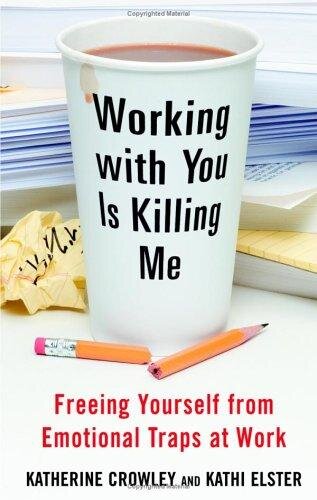Katherine Crowley and Kathie Elster, Working With You is Killing Me: Freeing Yourself from Emotional Traps at Work. Business Plus, 2007.
Referenced in: Church Conflict – Criticism, Difficult People, Difficult Conversations
LifeandLeadership.com Summary
Not all church leaders will find themselves in the same kind of difficult relationships that are typical of the private sector, but there are far more likenesses than differences. There is a lot of truth in the saying that “if you are not annoyed by someone you work with, you are probably working alone.” Churches included. In these situations, people need all the help they can get. This is where the resources by Crowly and Elster come in.
Crowley is a Harvard-trained psychotherapist and Elster is a business consultant. Together they present themselves as “undercover business therapists.” They have authored two volumes, Working With You Is Killing Me (2007) and Working for You Isn’t Working for Me (2009). These volumes may not be the main consults for church leaders, as there are several resources of this genre aimed specifically at the unique dynamics of congregations. But they contain enough useful insight to have a place in any church leader’s toolbox for dealing with difficult behavior in others.
This volume, Working With You is Killing Me (2007) looks at how we get “hooked” into emotionally draining situations with a co-worker, boss, or subordinate. They trace the physical, emotional, and mental symptoms of being hooked such as headaches, fatigue, anger, revenge fantasies, forgetfulness, etc. Next, they offer a “Four-Pronged Unhooking Technique” which is discussed in considerable detail:
- Unhook physically: breathe, exercise, calm and release your physical energy.
- Unhook mentally: Ask yourself, “What’s happening here?” Stick to the facts.
- Unhook verbally: Decide what you will say to resolve the problem.
- Unhook with a business tool: Scan your business toolbox and pick the best one. (22ff)
Another helpful piece is the list of roles we play wherein we may actually hook ourselves, constricting us professionally or limiting our ability to move ahead:
The Hero — the need to be idolized compels this individual to produce more and perform better than anyone else.
The Caretaker — Feels responsible for and tries to solve everyone else’s personal problems.
The Rebel/Scapegoat — Bends the rules and goes against the grain…even when it jeopardizes his or her career.
The Martyr — Wants recognition and praise for sacrifice and suffering on behalf of the company.
The Entertainer — Uses jokes and humor to break the tension and keep others happy.
The Peacemaker — Does whatever it takes the keep the peace.
The Invisible One — Stays out of trouble by staying out of the spotlight. (48-49)
They suggest ways of breaking out of these roles into more productive behaviors.
They also describe five common “Fatal Attractions,” i.e. toxic people that may keep us in their grip, and how to break free from each. These include the exploder, empty pit, saboteur, pedestal smasher, and chip-on-the-shoulder. (76ff)
Realizing, however, that managers also endure difficult behaviors in others, they also describe “Nine Management Headaches,” and offer practical ways of dealing with them: the chronically delayed, missing in action, cynic, passive-aggressive, attention seeker, bad attitude, slug, addict, and thief. (164ff)
Throughout, the authors use assessment tools, questionnaires, illustrative anecdotes, and specific scenarios to help readers understand themselves and others and apply the skills. It is a solution-based resource that is short on analysis and long on practical ideas.
From the Publisher
Scratch the surface of any company and you uncover a group of people often rubbing each other the wrong way in a hotbed of emotions — people feeling anxious about performance, angry with co-workers, and misunderstood by management. Leaders are burnt-out and assistants are buried in resentment.
Working With You is Killing Me helps readers “unhook” from these emotional pitfalls in the office and work with any personality, whether dealing with a peer, subordinate, or boss. Readers learn about the most common types of destructive workplace relationships including “The Empty Pit,” where a coworker starts out as nice but turns needy and “The Saboteur,” where sweet talk quickly turns into sabotage.
Valuable insights include:
- Documentation in place of frustration: When passed over for a promotion or a coworker takes credit for your work, don’t flip out. List your accomplishments or create a record of your involvement via email or memo.
- Take control by managing up: Instead of letting emotions get the better of you, avoid frustration by training your boss to meet regularly and always be prepared to report on your projects.
- Business Parenting: Employers should learn that being boss is always like being a parent and employees need to know exactly what’s expected of them.
About the Authors
Katherine Crowley is a psychotherapist and an in-demand public speaker. 1993 she became a partner in Kathi Elster’s New York based consulting company Small Business Strategy, Inc. Kathi Elster is a nationally recognized authority in the field of entrepreneurial consulting.
***For additional information on this resource, including reviews, click the bookstore links. Check the reference at page top or the links below for resource guides on related topics.***
Related Areas
See Other Resources on Church Conflict:
See Resources on Over 100 Areas of Ministry Leadership:


